 W
WGeorge Monck, 1st Duke of Albemarle, KG was an English soldier and politician, and a key figure on both sides of the English Civil War, as well as the Restoration of the monarchy to King Charles II in 1660.
 W
WRichard Fitzalan, 4th Earl of Arundel, 9th Earl of Surrey, KG was an English medieval nobleman and military commander.
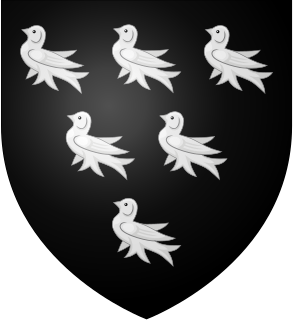 W
WSir John Arundell (1495–1561), of Trerice, Cornwall, nicknamed "Tilbury Jack", was a commander of the Royal Navy during the reigns of Kings Henry VIII and Edward VI and served twice as Sheriff of Cornwall.
 W
WBasil Beaumont, rear-admiral, was the fifth son, amongst the twenty-one children, of Sir Henry Beaumont, of Stoughton Grange and Cole Orton.
 W
WJohn Beaumont, 4th Baron Beaumont KG (1361–1396) was an English military commander and Admiral who served in the Hundred Years' War against the partisans of Pope Clement VII.
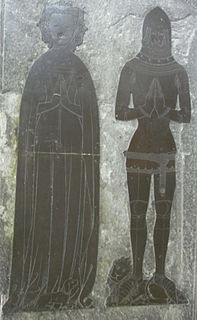 W
WThomas de Berkeley, 5th Baron Berkeley, The Magnificent, of Berkeley Castle and of Wotton-under-Edge in Gloucestershire, was an English peer and an admiral. His epithet, and that of each previous and subsequent head of his family, was coined by John Smyth of Nibley (d.1641), steward of the Berkeley estates, the biographer of the family and author of "Lives of the Berkeleys".
 W
WGeneral at Sea Robert Blake was an important naval commander of the Commonwealth of England and one of the most famous English admirals of the 17th century. His successes have been considered to have "never been excelled, not even by Nelson" according to one biographer. Blake is recognised as the chief founder of England's naval supremacy, a dominance subsequently inherited by the British Royal Navy into the early 20th century. Despite this, due to deliberate attempts to expunge the Parliamentarians from history following the Restoration, Blake's achievements tend not to receive the full recognition that they deserve.
 W
WGuy de Bryan, 1st Baron Bryan, KG was an English military commander and Admiral.
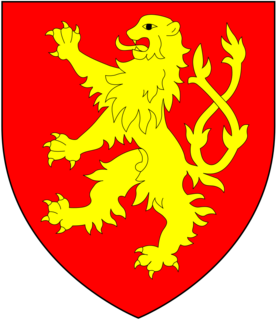 W
WBartholomew Burghersh, 1st Baron Burghersh, called "the elder", was an English nobleman and soldier, a younger son of Robert Burghersh, 1st Baron Burghersh and Maud Badlesmere, sister of Bartholomew Badlesmere, 1st Baron Badlesmere. He was the father of Bartholomew Burghersh the younger.
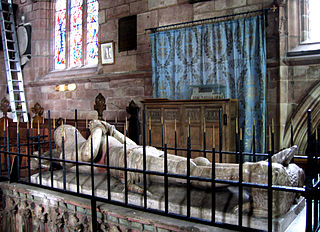 W
WSir Hugh Calveley was an English knight and commander, who took part in the Hundred Years' War, gaining fame during the War of the Breton Succession and the Castilian Civil War. He held various military posts in Brittany and Normandy. He should not be confused with his nephew, also Sir Hugh Calveley, who died in June 1393 and was Member of Parliament for Rutland.
 W
WVice-Admiral, Sir George Carew was an English soldier, admiral and adventurer during the reign of King Henry VIII who died in the sinking of the Royal Navy flagship Mary Rose at the Battle of the Solent during an attempted French invasion in the Italian War of 1542–1546. Scion of a controversial and dramatic family, Carew had a wild youth and explored widely, being arrested several times for associating with rebellious vassals of the king. Carew successfully tamed this nature in his later years, during which he became a trusted advisor and military officer in the King's service.
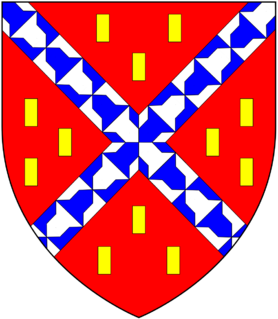 W
WSir Arthur Champernowne was an English politician, high sheriff and soldier who lived at Dartington Hall in Devon, England.
 W
WFredrik Henrik af Chapman was a Swedish shipbuilder, scientist and officer in the Swedish navy. He was also manager of the Karlskrona shipyard 1782-1793. Chapman is credited as the world's first person to apply scientific methods to shipbuilding and is considered to be the first naval architect.
 W
WThomas of Lancaster, 1st Duke of Clarence was a medieval English prince and soldier, the second son of King Henry IV of England, brother of Henry V, and heir to the throne in the event of his brother's death. He acted as councillor and aide to both.
 W
WReynold Cobham, 1st Baron Cobham of Sterborough, KG (c.1295–1361) was a medieval English knight and diplomat.
 W
WSir Philip Courtenay, of Powderham, Devon was the fifth son of Hugh Courtenay, 10th Earl of Devon (1303–1377). He was the founder of the cadet dynasty known as "Courtenay of Powderham", seated at the manor of Powderham, until then a former Bohun manor of little importance, whilst the line descended from his elder brother, the Earls of Devon of the mediaeval era, continued to be seated at Tiverton Castle and Okehampton.
 W
WNicholas de Crioll, of a family seated in Kent, was Constable of Dover Castle and Keeper of the Coast during the early 1260s. His kinsman Bertram de Criol had distinguished himself in these offices during the preceding 20 years and both were near predecessors of the eminent Warden of the Cinque Ports, Stephen de Pencester.
 W
WJohn Botetourt, 1st Baron Botetourt was an English military commander and admiral in the 13th and 14th centuries.
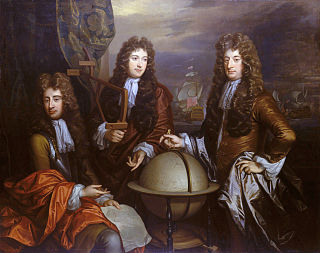 W
WAdmiral Sir Ralph Delaval (c.1641–c.1707) was an English admiral.
 W
WSir Francis Drake was an English sea captain, privateer, naval officer, and explorer. Drake is most famously known for his circumnavigation of the world in a single expedition, from 1577 to 1580, and was the first to complete the voyage as captain while leading the expedition throughout the entire circumnavigation With his incursion into the Pacific Ocean, he claimed what is now California for the English and inaugurated an era of conflict with the Spanish on the western coast of the Americas, an area that had previously been largely unexplored by Western shipping.
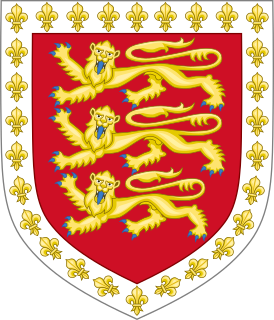 W
WJohn Holland, 1st Duke of Exeter, 1st Earl of Huntingdon, KG, of Dartington Hall in Devon, was a half-brother of King Richard II (1377–1399), to whom he remained strongly loyal. He is primarily remembered for being suspected of assisting in the downfall of King Richard's uncle Thomas of Woodstock, 1st Duke of Gloucester (1355–1397) and then for conspiring against King Richard's first cousin and eventual deposer, Henry Bolingbroke, later King Henry IV (1399–1413).
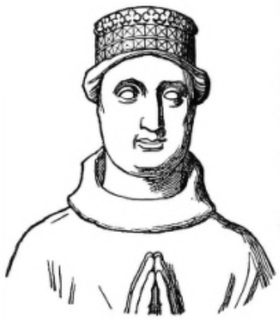 W
WJohn Holland, 2nd Duke of Exeter, 2nd Earl of Huntingdon was an English nobleman and military commander during the Hundred Years' War. His father, the 1st Duke of Exeter, was a maternal half-brother to Richard II of England, and was executed after King Richard's deposition. The Holland family estates and titles were forfeited, but John was able to recover them by dedicating his career to royal service. Holland rendered great assistance to his cousin Henry V in his conquest of France, fighting both on land and on the sea. He was marshal and admiral of England and governor of Aquitaine under Henry VI.
 W
WRichard Grey, 1st or 4th Baron Grey of Codnor KG was an English soldier and diplomat.
 W
WAdmiral Sir Richard Hawkins was a 17th-century English seaman, explorer, pirate and privateer. He was the son of Admiral Sir John Hawkins.
 W
WWalter Hungerford, 1st Baron Hungerford was an English knight and landowner, from 1400 to 1414 a Member of the House of Commons, of which he became Speaker, then was an Admiral and peer.
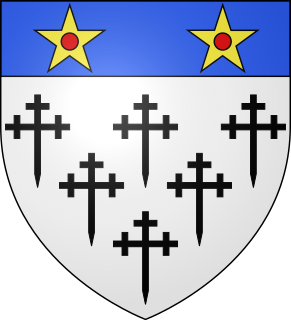 W
WWilliam de Clinton, 1st Earl of Huntingdon and Lord High Admiral, was the younger son of John de Clinton, 1st Baron Clinton (d.1312/13) of Maxstoke Castle, Warwickshire, and Ida De Odingsells who was the granddaughter of Ida II Longespee. The surname Clinton came from the lordship of Clinton in Oxfordshire, given to them at the Conquest. Geoffrey de Clinton was Lord Chamberlain and Treasurer of Henry I, while Roger de Clinton was Bishop of Coventry 1127–1148.
 W
WJohn Paveley was Grand Prior of the Order of Knights of the Hospital of Saint John of Jerusalem from 1358 until his death in 1371. In 1360 he served as Admiral of the Fleet against the French towards the end of the first phase of the Hundred Years' War.
 W
WSir Joseph Jordan was a naval officer and admiral. From a Thames shipowning family, he is initially recorded as importing tobacco from Nevis and Barbados aboard the Amity.
 W
WVice-Admiral Peregrine Osborne, 2nd Duke of Leeds, styled Viscount Osborne between 1673 and 1689, Earl of Danby between 1689 and 1694 and Marquess of Carmarthen between 1694 and 1712, was an English Tory politician.
 W
WSir Richard Leveson was an important Elizabethan Navy officer, politician and landowner. His origins were in the landed gentry of Shropshire and Staffordshire. A client and son-in-law of Charles Howard, 1st Earl of Nottingham, he became Vice-Admiral under him. He served twice as MP for Shropshire in the English parliament. He was ruined by the burden of debt built up by his father.
 W
WSir Roger de Leybourne (1215–1271) was an English soldier, landowner and royal servant during the Second Barons' War.
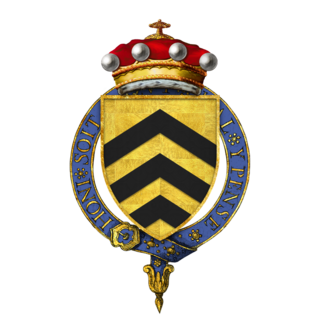 W
WWalter Manny,, 1st Baron Manny, KG, soldier of fortune and founder of the Charterhouse, was from Masny in Hainault, from whose counts he claimed descent. He was a patron and friend of Froissart, in whose chronicles his exploits have a conspicuous and probably an exaggerated place.
 W
WSir Robert Mansell (1573–1656) was an admiral of the English Royal Navy and a Member of Parliament (MP), mostly for Welsh constituencies. His name was sometimes given as Sir Robert Mansfield and Sir Robert Maunsell.
 W
WSimon de Montagu, 1st Baron Montagu was summoned to Parliament by writ and thereby became the 1st Baron Montagu. He was the ancestor of the great Montagu family, Earls of Salisbury.
 W
WJohn Neville, 3rd Baron Neville, was an English peer and soldier.
 W
WWilliam de Bohun, 1st Earl of Northampton, KG was an English nobleman and military commander.
 W
WHenry Percy, 1st Earl of Northumberland, 4th Baron Percy, titular King of Mann, KG, Lord Marshal was the son of Henry de Percy, 3rd Baron Percy, and a descendant of Henry III of England. His mother was Mary of Lancaster, daughter of Henry, 3rd Earl of Lancaster, son of Edmund, Earl of Leicester and Lancaster, who was the son of Henry III.
 W
WSir John Penington (1584?–1646) was an English admiral who served under Charles I of England.
 W
WSir William Montagu, 2nd Earl of Salisbury, 4th Baron Montagu, King of Mann, KG was an English nobleman and commander in the English army during King Edward III's French campaigns in the Hundred Years War. He was one of the Founder Knights of the Order of the Garter.
 W
WJohn Beaufort, 1st Marquess of Somerset and 1st Marquess of Dorset, later only 1st Earl of Somerset, was an English nobleman and politician. He was the first of the four illegitimate children of John of Gaunt (1340-1399) by his mistress Katherine Swynford, whom he later married in 1396. Beaufort's surname probably reflects his birthplace at his father's castle and manor of Beaufort in Champagne, France. The Portcullis heraldic badge of the Beauforts, now the emblem of the House of Commons, is believed to have been based on that of the castle of Beaufort, now demolished.
 W
WVice-Admiral of England Sir Thomas Spert was a mariner who reached the rank of vice admiral in service to King Henry VIII of England. He was sailing master of the flagships Mary Rose and Henry Grace a Dieu. He served as the first Master of Trinity House, the private corporation for maritime affairs in London. Spert Island off the coast of Antarctica is named for him.
 W
WMichael de la Pole, 1st Earl of Suffolk, 1st Baron de la Pole, of Wingfield Castle in Suffolk, was an English financier and Lord Chancellor of England. His contemporary Froissart portrays de la Pole as a devious and ineffectual counsellor who dissuaded King Richard II from pursuing a certain victory against French and Scottish forces in Cumberland, and fomented undue suspicion of that king's uncle John of Gaunt, 1st Duke of Lancaster.
 W
WRobert Ufford, 1st Earl of Suffolk, KG was an English peer. He was created Earl of Suffolk in 1337.
 W
WAdmiral Thomas Howard, 1st Earl of Suffolk, was a son of Thomas Howard, 4th Duke of Norfolk by his second wife Margaret Audley, Duchess of Norfolk, the daughter and heiress of the 1st Baron Audley of Walden.
 W
WWilliam Ufford, 2nd Earl of Suffolk was an English nobleman in the reigns of Edward III and Richard II. He was the son of Robert Ufford, who was created Earl of Suffolk by Edward III in 1337. William had three older brothers who all predeceased him, and in 1369 he succeeded his father. In the 1370s, he participated in several campaigns of the Hundred Years' War, but this period was not a successful one for England. Suffolk was closely connected to Thomas Beauchamp, Earl of Warwick and John of Gaunt, Duke of Lancaster, and his conciliatory skills were highly valued in national politics. He helped arbitrate in the conflict between Gaunt and the parliamentary Commons during the Good Parliament. In 1381, Suffolk took part in suppressing the Peasants' Revolt in East Anglia, after narrowly escaping the rebels himself. He died suddenly in 1382 while attending parliament, and since he had no surviving children, his title became extinct and his property was dispersed.
 W
WThomas de Beauchamp, 12th Earl of Warwick, KG was an English medieval nobleman and one of the primary opponents of Richard II.
 W
WAdmiral Sir William de Leybourne, was an English Knight and Military Commander.
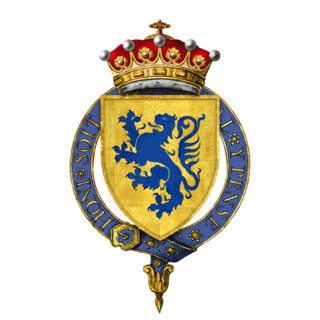 W
WThomas Percy, 1st Earl of Worcester, KG was an English medieval nobleman and naval commander best known for leading the rebellion with his nephew Henry Percy, known as 'Harry Hotspur', and his elder brother, Henry Percy, 1st Earl of Northumberland.
 W
WAdmiral Sir William Wynter was an admiral and principal officer of the Council of the Marine under Queen Elizabeth I of England and served the crown during the Anglo-Spanish War (1585–1604).
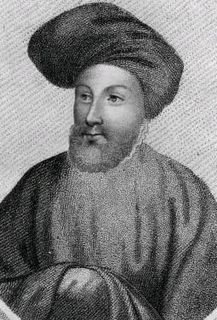 W
WEdward, 2nd Duke of York,, was an English nobleman and magnate, the eldest son of Edmund of Langley, 1st Duke of York, and a grandson of King Edward III of England. He held significant appointments during the reigns of Richard II, Henry IV, and Henry V, and is also known for his translation of the hunting treatise The Master of Game. He was killed at the Battle of Agincourt, one of the principal military engagements of the Hundred Years' War against France, in 1415.